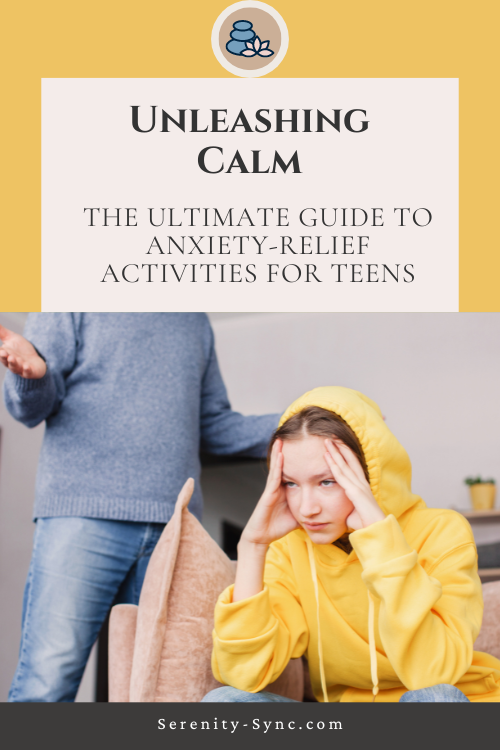In Brief
In this blog post, we will dive into the world of anxiety activities for teens, exploring various techniques and exercises to help manage anxiety effectively. From understanding the chemistry of anxiety to building a positive attitude and mastering relaxation techniques, this comprehensive guide aims to empower teens to conquer their fears and worries with confidence.
Understanding Anxiety
Anxiety is not just in the mind; it’s a complex interplay of hormones and neurotransmitters. Understanding the physiological responses to anxiety can help teens feel more in control. Stress hormones like cortisol can significantly impact anxiety levels, while neurotransmitters like serotonin and dopamine play vital roles in regulating mood. Anxiety can manifest physically, emotionally, and cognitively, affecting various aspects of a teen’s life.
Inner Peace
Introducing teens to mindfulness meditation can increase self-awareness and help them stay present and calm during anxious moments. Grounding techniques and guided imagery can create a sense of inner peace and tranquility, while body scans release tension and promote relaxation. Cultivating gratitude can shift focus from anxiety to positivity, fostering a more balanced mindset.
Prevention and Intervention Techniques
Encouraging teens to journal about their anxiety triggers and responses can provide valuable insights. Identifying patterns in anxiety episodes helps in developing personalized coping strategies. Reflecting on past successes in managing anxiety boosts confidence, and seeking professional help when needed is essential. Breaking the stigma around mental health and building a support system are crucial steps in managing anxiety effectively.
Fun Fact
Did you know that practicing mindfulness for just 10 minutes a day can significantly reduce anxiety levels in teens?
Building a Positive Attitude
Challenging negative self-talk and replacing it with positive affirmations
Negative self-talk can significantly impact a teen’s mental well-being. By challenging these detrimental thoughts and replacing them with positive affirmations, teenagers can shift their mindset towards a more optimistic outlook. Encouraging phrases such as “I am capable” or “I am worthy” can help build self-confidence and combat self-doubt.
Practicing cognitive restructuring to reframe anxious thoughts
Cognitive restructuring involves identifying negative thought patterns and replacing them with rational and balanced perspectives. Teens can learn to reframe anxious thoughts by questioning the validity of their concerns and adopting a more realistic viewpoint. This technique empowers adolescents to approach challenging situations with clarity and resilience.
Cultivating self-compassion and acceptance of imperfections
Embracing self-compassion involves treating oneself with kindness and understanding, especially in the face of setbacks or mistakes. By accepting their imperfections and practicing self-love, teens can enhance their emotional well-being and develop a more positive self-image. This mindset shift fosters resilience and inner strength.
Engaging in activities that boost self-esteem and confidence
Participating in activities that align with their interests and strengths can bolster a teen’s self-esteem and confidence levels. Whether it’s pursuing a hobby, volunteering, or excelling in academics, these achievements contribute to a sense of accomplishment and worth. Encouraging teens to explore their passions can positively impact their mental health.
Celebrating small victories in the journey towards anxiety management
Acknowledging and celebrating small milestones in the process of managing anxiety is crucial for teen’s motivation and progress. Whether it’s facing a fear, trying a new coping strategy, or seeking support, each step forward is a reason for celebration. Recognizing these achievements reinforces positive behavior and resilience in teens.
Relaxation Techniques
Teaching teens diaphragmatic breathing for relaxation and stress relief
Diaphragmatic breathing, also known as belly breathing, is a powerful relaxation technique that helps teens reduce stress and anxiety. By focusing on deep, slow breaths that engage the diaphragm, adolescents can activate the body’s relaxation response and calm their mind. This technique is simple yet effective in promoting a sense of calmness.
Exploring the 4-7-8 breathing technique to calm the nervous system
The 4-7-8 breathing technique involves inhaling for 4 seconds, holding the breath for 7 seconds, and exhaling for 8 seconds. This rhythmic breathing pattern helps regulate the nervous system, induce relaxation, and reduce feelings of anxiety. Teens can incorporate this technique into their daily routine for improved emotional well-being.
Using breathwork as a tool to center oneself during moments of anxiety
Breathwork techniques, such as mindful breathing and paced breathing, serve as valuable tools for teens to center themselves during episodes of anxiety. By focusing on their breath and practicing mindfulness, adolescents can ground themselves in the present moment and alleviate feelings of overwhelm. Breathwork offers a sense of control and calmness in turbulent times.
Incorporating breathing exercises into daily routines for long-term benefits
Consistent practice of breathing exercises not only provides immediate relief from anxiety but also offers long-term benefits for teens’ mental health. By integrating breathing techniques into their daily routines, adolescents can build resilience against stressors and cultivate a sense of inner peace. Breathing exercises become a sustainable coping mechanism for managing anxiety.
Creating personalized breathing exercises tailored to individual preferences and needs
Tailoring breathing exercises to suit individual preferences and needs enhances their effectiveness in combating anxiety. Whether it’s focusing on visualization, incorporating aromatherapy, or practicing breathing outdoors, personalized techniques resonate with teens on a deeper level. Customized breathing exercises provide a sense of ownership and empowerment in anxiety management.
Conclusion
As we conclude our exploration of anxiety management for teens, it is evident that building a positive attitude, embracing relaxation techniques, and cultivating a strong support system are essential pillars in empowering adolescents to navigate their mental health challenges. By equipping teens with the tools to challenge negative thoughts, practice self-care, and engage in calming practices, we pave the way for a generation of resilient and emotionally intelligent individuals. Let’s continue to advocate for mental health awareness and support teenagers in their journey towards holistic well-being.
Fun Fact
Physical exercise releases endorphins, the body’s natural mood lifters, making it a fantastic way for teens to combat anxiety and boost their overall well-being.


Hi there! This article couldn’t be written much better!
Reading through this post reminds me of my previous roommate!
He constantly kept talking about this. I’ll send this article to him.
Fairly certain he’ll have a good read. I appreciate you for sharing!
Hey Cheryl ! Thank you so much for your kind words, they really made my day! 😊 It’s always awesome to hear that our content resonates with readers and sparks conversations. Feel free to share it with your roommate – who knows, maybe it’ll bring back some good memories or spark some interesting discussions! Thanks again for your support and for spreading the word.